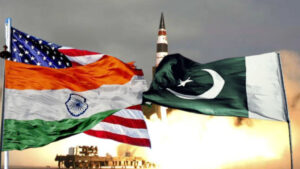By Shamil Abdullah & Muhammad Abubakr
The recent US sanctions on Pakistan’s public and private entities seem less about proliferation and more about geopolitics. The decision announced on December 18, targets four Pakistani entities including the state-owned National Development Complex (NDC) and its suppliers. These sanctions are part of a broader series of US actions against Pakistan’s missile and nuclear program. Moreover, the US Deputy National Security Adviser Jon Finer raised surprising remarks regarding Pakistan’s Missile Program. Finer said that Pakistan’s long-range missile program is “fundamentally focused on the US” and called it an “emerging threat” at the Carnegie Endowment for International Peace. This baffling statement appears to lack justification, raising questions about its basis and intent. It suggests that Finer’s remarks may have been influenced by another state’s strategic interests or agendas, rather than grounded in objective analysis or evidence. Unsurprisingly, these assertions have been widely criticized by Pakistan. Islamabad insists that its strategic deterrent is aimed solely at India and there is no evidence to suggest that Pakistan is developing missiles capable of reaching the US mainland. Pakistani officials have repeatedly stressed that their missile program, with a maximum range of 2,750 km, is a defensive measure aimed at deterring potential aggression from India. Therefore, the notion that Pakistan’s missile program poses a threat to the US seems “unfounded” and overly paranoid. Interestingly, the Pentagon adopted a more cautious approach. Pentagon Press Secretary Maj. Gen. Pat Ryder refrained from criticizing Pakistan directly and emphasized the US’s long-standing military partnership with Pakistan. This showed a divide as some US officials wanted a tougher stance while others wanted to maintain ties with Pakistan.
Having said that, it is important to highlight the double standards in the US approach towards South Asia. The selective application of sanctions and the negative commentary surrounding Pakistan’s nuclear program only reinforces the perception of bias against Pakistan. While Pakistan faces scrutiny and penalties for its missile program, India, with its extensive missile and nuclear capabilities, continues to be shielded from similar examination. For instance, India’s Agni-V missile, with a range of over 5,000 km, raises no alarms in Washington.
This concern was also echoed in a statement issued by the Ministry of Foreign Affairs (MoFA), in which the spokesperson noted that Pakistan’s eastern neighbor possesses far more potent missile capabilities. Yet, the U.S. seems to raise this issue at the behest of others. According to the statement, it is illogical to suggest that Pakistan’s ballistic missile program is directed at any state other than India.
The question arises from U.S. Deputy National Security Adviser Jon Finer’s remarks: why would Pakistan develop its missile capability for any state beyond South Asia? Would Pakistan intentionally seek to make more enemies, thereby forcing itself to invest even more in defense while struggling with an already cash-strapped economy? The answer to this question is clear: it is implausible that Pakistan’s missile program is intended for any state other than India.
Additionally, there seems to be an inconsistency between the statements of the U.S. Deputy National Security Adviser and the Pentagon Press Secretary. While the former raised concerns about Pakistan’s missile program, the latter avoided making any harsh remarks on the matter. This either indicates a political divide between the Pentagon and the White House or suggests that the U.S. administration is now engaging in damage control following the statement by Deputy NSA Finer.
However, Pakistan maintains that it cannot relinquish its right to develop capabilities necessary for maintaining credible minimum deterrence. This stance is rooted in the potential for any future Indian offensive, misadventure, or the development of capabilities that may require a response. It would be unreasonable for Pakistan not to future-proof its ballistic missile program, especially as India continues to expand and refine its options with the blessing of the U.S. Such developments on India’s side include advancements in missile technology and space launch vehicles, which alter the regional strategic balance. For Pakistan, ensuring its security through credible deterrence is not just a choice but a necessity dictated by its geopolitical realities.
On the other hand, since Pakistan has developed its capabilities with India as the only consideration, it is essential to examine the advancements India has made in missile technology over the past year. In March 2024, India conducted a test of its Agni-V missile, a Multiple Independently Targetable Reentry Vehicle (MIRV) with a range of 5,000 km. Similarly, in April 2024, India tested its next-generation Agni-P missile, which has a range of 1,000–2,000 km. Finally, in November 2024, India tested its first hypersonic missile, boasting a claimed range of 1,500 km. These developments highlight India’s rapid progress in acquiring advanced missile capabilities, including hypersonic and MIRV technologies, which significantly enhance its strategic reach and impact. Realistically, India’s ballistic missile program, with its growing sophistication and extended range, poses a greater threat to the United States than Pakistan’s.
1When comparing the two, it is evident that U.S. policy towards Pakistan remains biased. India’s missile program is not only more extensive and advanced than Pakistan’s but is also developing at a significantly faster pace. Despite this, the U.S. remains not just tolerant but actively supportive of India’s missile advancements. This level of support appears ironic, as India’s missile program, with its sophisticated capabilities and greater reach, is seen as posing no threat to the U.S., whereas Pakistan’s program is treated as a concern.
Moreover, the sanctions imposed on Pakistan’s missile program are unlikely to have any meaningful impact, as Pakistan has long relied on its own resources and capabilities to develop its ballistic missiles. These sanctions appear to be influenced by external pressure from another state rather than being rooted in genuine security concerns. The statement by Deputy NSA Jon Finer further underscores the irresponsible behavior of a sitting U.S. government representative, raising questions about the consistency and impartiality of U.S. policies in the region.
The views expressed in this article belong to the authors only, and do not necessarily reflect the views of The Global Politico.








